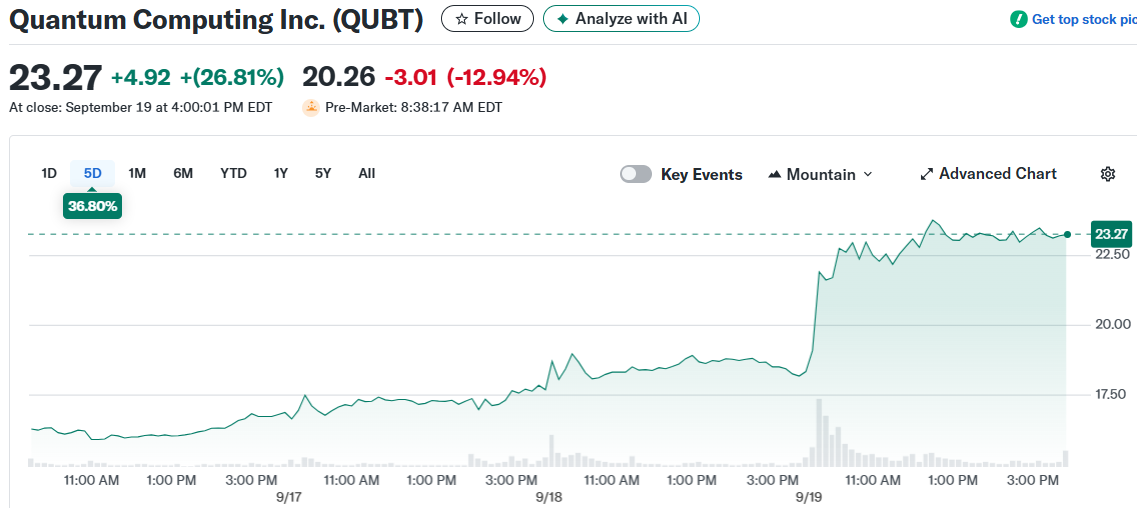TLDR
- Quantum Computing (QUBT) stock fell over 10% in pre-market trading after announcing a $500 million private placement
- Company will sell 26,867,276 shares to institutional investors in an oversubscribed offering
- The share sale follows a 26.8% surge on Friday after Lake Street analyst set a new Street-high price target of $24
- Total cash position expected to reach $850 million after the transaction closes around September 24
- Funds will be used for commercialization, acquisitions, and expanding sales and engineering teams
Quantum Computing stock dropped more than 10% in pre-market trading Monday despite receiving bullish analyst coverage just days earlier. The decline came after the company announced plans to raise $500 million through a private placement with institutional investors.

The timing creates an interesting dynamic for QUBT shareholders. Friday brought a 26.8% surge after Lake Street analyst Max Michaelis initiated coverage with a “Buy” rating and set a Street-high price target of $24.
The private placement involves selling 26,867,276 shares to institutional investors. The offering was oversubscribed and priced at market under Nasdaq rules, with closing expected around September 24.
Several major existing shareholders participated in the deal. A leading global alternative asset manager also made its first investment in the company through this placement.
Quantum Computing expects its total cash position to reach approximately $850 million once the transaction closes. The company currently holds a market valuation of $3.72 billion.
Fund Deployment Strategy
Management outlined specific plans for the $500 million in proceeds. The company will use funds to fast-track commercial rollouts and pursue strategic acquisitions.
Expanding sales and engineering teams represents another key priority. The additional personnel will support the company’s growth initiatives as it scales operations.
Working capital needs and general corporate purposes round out the planned uses. This financial flexibility comes as the quantum computing sector continues evolving.
The shares in this private placement have not been registered under the Securities Act of 1933. They cannot be offered or sold in the United States without registration or an applicable exemption.
Quantum Computing has agreed to file a resale registration statement with the SEC. This will allow the new shareholders to trade their positions once approved.
Analyst Optimism Continues
Lake Street’s Michaelis remains bullish on the company’s prospects. He describes QUBT as a “compelling way to participate in the rapidly growing market of quantum computing.”
The analyst acknowledges that broader quantum computing adoption remains in early stages. However, he believes the company is approaching a turning point for revenue growth.
Michaelis expects revenue to increase substantially in 2026 and 2027. This growth outlook stems from ongoing industry advancements and Quantum’s early leadership position.
The analyst ranks as a five-star performer on TipRanks. He holds the #163 position out of 10,050 tracked analysts with a 90% success rate and 136.80% average return per rating.
QUBT currently carries a Moderate Buy consensus rating on TipRanks. This rating comes from one Buy and two Hold recommendations from analysts.
The average price target sits at $18.17, implying 21.9% downside from current levels. Year-to-date, QUBT stock has gained 40.6% despite Monday’s pre-market decline.
Titan Partners Group serves as the sole placement agent for the offering. The transaction represents one of the larger capital raises in the quantum computing space this year.






